- Home
- Valerie Hansen
The Doctor's Newfound Family Page 3
The Doctor's Newfound Family Read online
Page 3
Taylor could already tell it was not going to be enough to simply check on her well-being via others. He was going to take a personal interest in the situation. There was no getting around it, no talking himself out of it.
As far as he was concerned, divine providence had placed him in this city on this night and had led him to make these particular acquaintances. It was therefore his duty to do all he could to help—with no thought of gain.
He had not become a doctor in order to get rich; he had chosen his profession because he truly wanted to benefit mankind. If he had wanted a more lucrative career, he would have followed in his father’s footsteps and become a lawyer, or in his grandfather’s as a judge.
Instead, he had studied medicine for nearly a year under the best minds at Massachusetts General Hospital, then had apprenticed for a while before he’d bid his family goodbye and headed west to practice.
More than half the time he wasn’t remunerated for his efforts, and if he was, payment was likely to be a sack of potatoes or mealy flour or an occasional scrawny chicken. He had thought, with the discovery of gold and San Francisco’s burgeoning economy, he’d easily find plenty of wealthy patients. Instead, he’d encountered more poverty and need than he’d imagined possible.
That was why he’d begun to donate his services at places like the city’s two major orphan asylums and had been so adamant in his insistence that San Francisco needed a care facility devoted solely to the illnesses of children. As it stood now, the poor little things who could not be tended at home were carted off to the city and county hospitals, where they were then exposed to all sorts of nasty diseases and were in the constant presence of morbidity.
His horse nickered, disturbing his musings. Taylor looked up to see the approach of his passengers. He tipped his bowler to them. “Are you ready to go?”
Spine straight, shoulders squared beneath her fitted woolen coat, Sara Beth nodded. “Yes. Thank you, Dr. Hayward. If you will assist me, then hand me Josiah, I would be much obliged.”
It worried Taylor to see her so apparently in control of her emotions. The boys seemed a bit sniffly, as children were wont to be anyway, but there wasn’t a sign of tears in their sister’s eyes.
As he offered his hand, he felt a strange hardness press into his palm. Pausing, he turned her hand over and saw what looked like the end of a smooth, thin stick. His puzzled glance caused her to falter ever so slightly.
“Oh. Forgive me,” Sara Beth said, withdrawing the needle and displaying it for him with a trembling hand. “As I was leaving home I thought I might need some method of protection so I brought along one of Mother’s knitting needles. I had forgotten about it until now.”
“I hardly consider a sliver of bone a suitable defensive weapon,” Taylor said. “You could have been hurt walking these streets alone at night.”
He saw her countenance darken, her expression close. “Yes,” she said, taking the baby and settling him in her lap where she could hold him close. “I might have been shot and killed, mightn’t I?”
Without further comment he lifted the older boys into the crowded buggy, squeezed himself onto the single seat and took up the reins.
Perhaps he had overstepped propriety in his concern for the young woman, Taylor reasoned, but someone had to tell her she had behaved in a most foolish manner. If that decision to follow her parents into the dangers of the night was typical behavior, she wasn’t nearly as mature and level-headed as he’d first thought. Nor was she likely to be able to properly care for what remained of her family by herself.
Chapter Three
The steady, rhythmic echo of the horse’s hooves on the cobblestone and brick-paved streets provided a soothing tempo until they had proceeded far enough from the busiest areas of the city to encounter hard-packed dirt dotted with muddy potholes.
To Sara Beth’s relief, all the younger children had nodded off before the doctor’s buggy had reached the portion of Pike Street where their home stood.
“This is it,” she said, stifling a sigh and pointing. “That two-story, gray clapboard with the double porches. You can let us off in front.”
As the doctor climbed down to hitch his horse to a cast-iron ring, he paused. Tensing, he held up his hand to stop her instead of continuing around to help her disembark. “Wait. Stay there.”
“Why? What’s wrong?”
“I think I see someone on your porch.”
“That’s silly. There can’t be. Why would anyone…?” Peering at the house, she realized he was right. There was someone on her front porch. And another man on the upstairs porch that mirrored the structure at ground level. Judging by their shadowy forms, both men were carrying rifles.
Sara Beth remained in the buggy as she cupped her hands around her mouth and called out, “Who are you? What do you want?”
The gunman on the lower porch stepped off and started along the boarded walkway toward her. There was no mistaking the menace in his movements. She might have assumed she was overreacting but the buggy horse also seemed nervous, almost unseating her when it suddenly lurched backward to the end of its tether and stamped its hooves.
The man paused halfway to the street and struck a stalwart pose, his boots planted solidly apart, his rifle spanning his chest. “This house is off-limits,” he said. “Sheriff’s orders.”
“But that’s impossible. I live here,” Sara Beth insisted.
“Not any more you don’t. This property is sealed. No one can come or go,” the guard replied.
“That’s ridiculous. My father, Robert Reese, is the owner.” The gunman’s cynical chuckle chilled her to the bone.
“That’s what you think, little lady. I have it on good authority that this property belongs to the U.S. government now.”
“Who told you that? Who sent you?”
“I get my orders from Sheriff Scannell, like I said.”
Sara Beth was not about to concede defeat. “Where did he get that authority?”
“From Judge Norton, I reckon.”
The doctor had gotten back into his buggy and was again taking up the reins when Sara Beth noticed him. “What are you doing? I’m not going anywhere. This is my home and I intend to claim it.”
“Over their objection?” he asked. “I think that would be more than unwise, miss. I think it would be suicide.”
“I’m not afraid of them, even if you are.”
“Very noble, I’m sure. However, I have only a pistol and you are armed with a knitting needle. How do you propose we overwhelm at least two men with rifles and sidearms?”
“I don’t know.” Her voice rose. “They’re in the wrong. We can’t simply give in to such unfairness.”
“We can retreat to fight another day,” he said. “Hang on.” He gave the lines a snap and the horse took off smartly, pushing Sara Beth back against the padded seat in spite of her efforts to lean forward.
She bit her lower lip and fought a swelling feeling of exasperation and powerlessness. This couldn’t be happening! Everything she and her family owned was locked up in that house. She didn’t even have a hairbrush or a change of clothing for herself or for the boys.
The doctor slowed the horse’s pace when they were several blocks away. “Where to?” he asked.
“What?” She blinked rapidly to quell her tears of frustration.
“I can’t very well take you home with me and I don’t think the Cobweb Palace is a fit place, either. Do you have friends or family you could stay with until we get this mess sorted out?”
She noted his use of the pronoun “we,” but chose to ignore the implication. “I have no family in San Francisco and Mother’s friends are mostly affiliated with the Ladies’ Protection and Relief Society.”
Sighing, she said, “I had hoped to delay this decision, but I suppose I have no choice. We shall have to go straight to their orphan asylum. Do you know where it’s located?”
She was relieved when he told her that he did. However, when he added, “I’ve ha
d the sad duty of treating some of those poor little ones,” her spirits plummeted. She and her brothers were now on a totally different social stratum, weren’t they? In a matter of hours they had gone from being part of a middle-class family to being destitute, just like the dirty street urchins who begged along the piers and alleys down by the wharf.
Raising her chin and closing her eyes, Sara Beth vowed that as long as she had breath in her body, her remaining family would never have to beg. She would work somewhere, do something that generated an honest living, no matter how meager, God willing.
And, please Lord, show me how to get our house and belongings back, too, she prayed silently. She didn’t know how she’d manage to accomplish that, but she would not give up trying, no matter what.
There was no need to hurry the horse along once they were in the clear, Taylor concluded. It was nearly morning. Although the city would soon be bustling with its usual daytime activities, there was probably at least an hour more before the keepers of the orphanage would rise and begin to prepare the first meal of the day.
Mulling over the plight of his passengers made him so angry he could barely contain his ire. It was fraud and abuses of the law such as these that had brought about the formation of the Vigilance Committee in the first place. The ballot boxes had been rigged, the honest votes nullified by internal corruption and the offices such as judge and sheriff sold to the highest bidders. Little wonder someone in power had had no trouble getting quick control of the Reese home and laboratory.
His own father and grandfather would have been astounded to hear of the despotism rampant in the city. Reform was urgently needed. And as far as he was concerned, men like him were charged, by their own innate sense of honor, to rise up and facilitate a change.
That was why he had joined the Vigilance Committee and why he was still an active member of the widespread secret society. He might not have been able to help Miss Sara Beth immediately, but he would help her. Someone was going to pay for turning her and her little brothers out into the night. He was going to see to it.
The horse ambled along the Montgomery block of hotels and up Sacramento Street past the four-story brick Rail Road House, a hotel that boasted accommodations for up to two hundred persons at one time, clean bedding and fresh water. The little figure of a locomotive atop its weather vane was said to anticipate San Francisco’s eventual joining with the rest of the States by rail.
Taylor glanced at Sara Beth as he guided his horse up California Street and onto the sweeping, tree-lined drive that led to the orphanage. The building had been, and still was, a palatial private home, although living quarters for the host family were separate from the housing for the orphans and live-in staff. Ella McNeil, the matron, watched over her charges and managed the house with an iron hand. Unlike the Reese children, many of the other orphans had been living on the streets, unsupervised, for months or even years and were therefore in dire need of discipline and moral guidance.
“Miss?” Taylor said quietly. “We’re here.”
Sara Beth opened her eyes and nodded. “I know. I haven’t been asleep.”
“Would you like me to come in with you?”
“Yes, if you don’t mind. I can manage Josiah, but I can’t carry them all. And the older boys may be upset when they realize where we are.”
“I understand.”
He climbed down and circled the buggy to assist her.
She passed him Josiah, then gently woke Mathias and Luke. “We need to get out here, boys.”
Mathias rubbed his fists over his eyes and yawned. “Are we home?”
“Not exactly,” Sara Beth said. “We’ll be staying here for a bit while we get Papa’s affairs settled.”
Luke leaned past him to look. “What are we doing here? Where are we?”
“I wanna go home,” Mathias began to wail.
“Give him to me,” the doctor said. “I’ll handle him. You, too, Luke.” He held out his arms and took the boys from her one at a time, setting all but Josiah on the ground at his feet and offering Sara Beth his free hand.
When she placed her smaller, icy fingers in his, he felt an unexpected pang of pity. That would never do. A proud woman like her would surely take offense if she even suspected that he was feeling sorry for her.
She faltered once with a little stumble, causing him to reach to cup her elbow.
“I’m fine, thank you. I can manage,” she said, righting herself and marching proudly up to the ornate front door of the stone-walled mansion. She rapped with the brass knocker and waited.
When the door swung open and the matron saw her, she greeted her with open arms. “Oh, darlin’, I heard what happened. It’s awful. Plum awful. You come right in and make yourself at home. We’re proud to have you.”
As Taylor watched, the stalwart young woman became a child again. Catching back a sob, she fell into Mrs. McNeil’s ample embrace. Taylor could see her shoulders shaking with silent weeping as the older woman patted her on the back. He didn’t want her to suffer, but he knew that the sooner she began to properly grieve her enormous loss, the sooner she’d recover.
“Let’s take the boys in and get them settled,” he suggested as soon as the two women stepped apart.
Ella wiped her eyes with the corner of her starched, white apron. “Land sakes, yes. I’m forgettin’ my manners. You come along, now,” she said to Luke and Mathias. “We’ve got gobs of other boys for you two to meet and a bunk you can share.” She glanced at Josiah in the doctor’s arms. “Do you think the littlest one will be all right in there or shall we send him to stay with the infants?”
Before Taylor could reply, Sara Beth snatched up the baby and shook her head. Her tears were gone except for slight dampness on her cheeks. “Josiah stays with me. I won’t have him put with strangers.”
“Of course, of course.” The matron rubbed the girl’s shoulder through her coat. “It’s been a long, trying night for all of you. We’ll talk more about making permanent arrangements later.”
No one had to tell Taylor what Sara Beth’s reaction to that would be. He knew she’d resist before she opened her mouth.
“There’s no need. We won’t be staying. As soon as I get my father’s business affairs settled I’ll be going back home,” she said flatly. “I did want to discuss possible employment for myself, though. Mother’s needlework was finer than mine, of course, but she was my teacher and I promise to do my very best. Is there a chance I could work for you like Mother once did, Mrs. McNeil?”
Taylor could see that the matron was hesitant. He privately caught her eye and gave a silent, secret nod.
To his relief, she said, “I’m sure we can find something. Perhaps part-time in the kitchen. Would that suit?”
“Anything will do,” Sara Beth said. “If you will show me where to place Josiah while he naps, I can start immediately.”
“Nonsense,” Ella said. “There’ll be plenty of time for that. First, we need to get all of you settled and then fed. When you’ve rested, we’ll talk further.”
Sara Beth’s deep sigh as a result was almost a shudder. “Thank you. I am weary. And there is so much on my mind right now I can hardly think.”
“Little wonder,” the doctor offered. “It’s been a long night for all of us. Will you be all right if I take my leave?”
Whirling, she acted surprised that he was still there. “Of course. And thank you for looking after us.”
“My pleasure,” he said with a slight bow. He touched the brim of his bowler and smiled at the matron, too. “Ladies. If you’ll excuse me?”
He managed to retain the smile until he had turned away and walked back outside. There was a deeply troubling wrong to right and no time to waste. If Abe Warner had been correct in his assumption about the gold samples kept in Reese’s private assay office, it might already be too late to preserve their integrity.
Nevertheless, he had to try. And his first stop was going to be the Coleman house. William T. Coleman was the pr
esident of the Vigilance Committee, and although their roster was kept by number rather than by name, most of the members knew whose loyalty could be counted on in an emergency.
Taylor mounted his buggy and shouted to the horse as he snapped the reins. There was no time to waste. A helpless family was being mistreated and he was not going to stand idly by and watch it happen.
The middle-aged gentleman arrived on Pike Street in a cabriolet pulled by a matched pair of sorrel geldings and driven by a hireling in a frock coat and top hat.
As he disembarked in front of the two-story frame house, he grinned. This plan had come together even better than he’d anticipated. With Isabelle dead, too, there was no one left to stand in his way, no one who might know what Robert had discovered and thereby ruin his reputation. Or worse.
He strode up the front walk and onto the porch where he was met by the sheriff and two other rough-looking men.
“Sheriff Scannell,” the gentleman said with a slight nod. He eyed the others with undisguised loathing and didn’t offer to shake anyone’s hand, though his own hands were gloved in pearl kidskin to match his cravat. “I see you’re keeping company with the usual riffraff.”
The sheriff laughed raucously and spit over the porch railing. “Meaning yourself, I suppose, Mr. Bein? You decide yet how you’re goin’ to explain all this?”
Bein grinned. “As long as the losses are credited to Reese instead of to me, I won’t have anything to explain. Harazthy is so engrossed in that new vineyard of his, he barely notices what goes on around the mint.”
“What about the Vigilance Committee? Ain’t you worried about them?”
“Not in the least. I have it on the personal authority of Governor Johnson that Sherman is about to be made Major General of the second division of militia for San Francisco. He’ll soon take care of the vigilantes.”
Scannell shrugged and spat again before wiping his mustache with the back of his hand. “All right. If you say so. It’s your funeral.”
Leering cynically, William Bein snorted approval. “Not my funeral, gentlemen, my partner’s, may he rest in peace.”

 Military K-9 Unit Christmas: Christmas Escape ; Yuletide Target
Military K-9 Unit Christmas: Christmas Escape ; Yuletide Target Marked For Revenge (Emergency Responders Book 2)
Marked For Revenge (Emergency Responders Book 2) Canyon Standoff
Canyon Standoff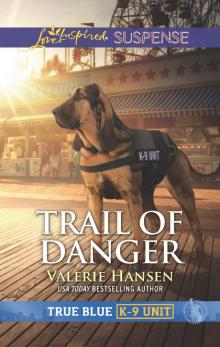 Trail of Danger
Trail of Danger A Puppy's Tale
A Puppy's Tale Marked for Revenge
Marked for Revenge Fatal Threat
Fatal Threat Christmas Vendetta
Christmas Vendetta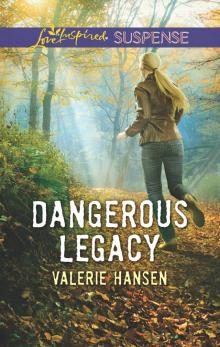 Dangerous Legacy
Dangerous Legacy Blessings of the Heart
Blessings of the Heart Montana Reunion
Montana Reunion Her Montana Cowboy
Her Montana Cowboy Wilderness Courtship
Wilderness Courtship Rookie K-9 Unit Christmas
Rookie K-9 Unit Christmas Rescuing the Heiress
Rescuing the Heiress The Danger Within
The Danger Within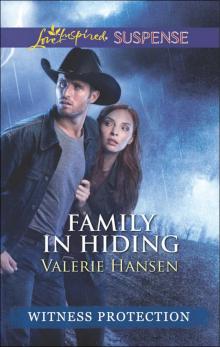 Family in Hiding
Family in Hiding Love Inspired December 2013 - Bundle 2 of 2: Cozy ChristmasHer Holiday HeroJingle Bell Romance
Love Inspired December 2013 - Bundle 2 of 2: Cozy ChristmasHer Holiday HeroJingle Bell Romance The Silk Road: A New History
The Silk Road: A New History Search and Rescue
Search and Rescue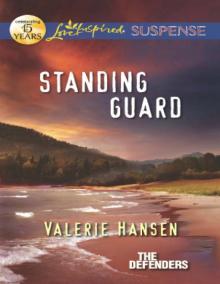 Standing Guard
Standing Guard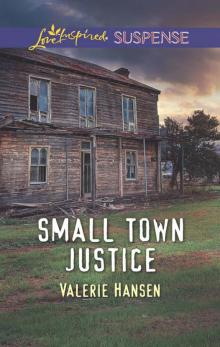 Small Town Justice
Small Town Justice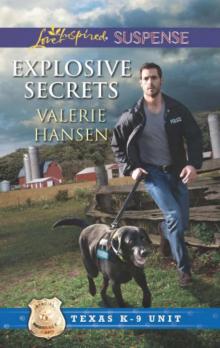 Explosive Secrets (Texas K-9 Unit)
Explosive Secrets (Texas K-9 Unit) Threat of Darkness
Threat of Darkness Bound by Duty
Bound by Duty The Hamilton Heir
The Hamilton Heir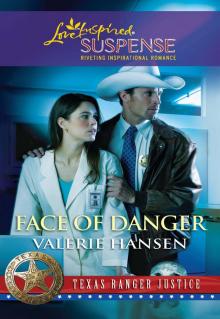 Face of Danger
Face of Danger The Troublesome Angel
The Troublesome Angel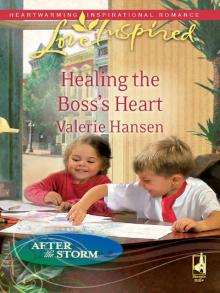 Healing the Boss’s Heart
Healing the Boss’s Heart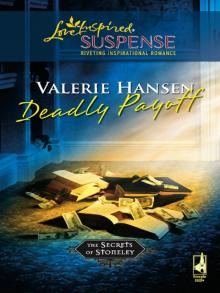 Deadly Payoff
Deadly Payoff Samantha's Gift
Samantha's Gift Her Cherokee Groom
Her Cherokee Groom Everlasting Love
Everlasting Love The Perfect Couple
The Perfect Couple Blessings of the Heart and Samantha's Gift
Blessings of the Heart and Samantha's Gift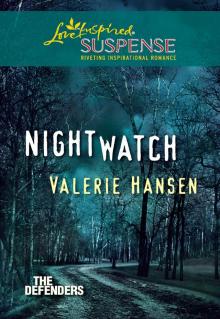 Nightwatch
Nightwatch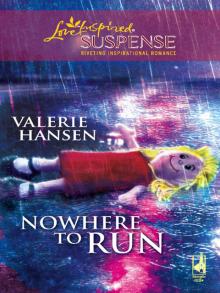 Nowhere to Run
Nowhere to Run The Doctor's Newfound Family
The Doctor's Newfound Family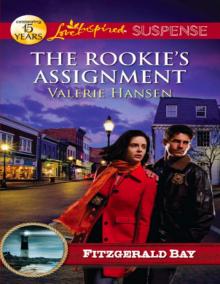 The Rookie's Assignment
The Rookie's Assignment Frontier Courtship
Frontier Courtship Out of the Depths
Out of the Depths Special Agent
Special Agent Hidden in the Wall
Hidden in the Wall